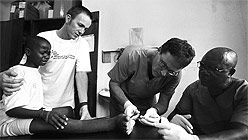“It’s taken off his ear, and the question is, how much of his brain has gone with it?”
More or less step by step, Mark Hopkins’ film Living in Emergency walks us through the makeshift surgery that will answer this question, uttered in a flat monotone by a Western doctor in a war-torn corner of Africa with no medical infrastructure to speak of.
There will be other horrors, though not too many of them, in this sober, absorbing documentary about the Medecins Sans Frontieres, commonly known as MSF (or, in the United States, Doctors Without Borders). The film is graphic only as necessary to convey a sense of the hair-raising conditions routinely encountered by doctors volunteering for the privately funded NGO’s missions in Liberia and the Democratic Republic of the Congo.
Hopkins, a fifth-generation Kenyan educated in England and the United States, began his career in Hollywood, then left to form his own nonfiction film production company. His approach is small-scale, intimate and observant, and the point of view rests squarely with four physicians with varying experience in MSF.
Chris Brasher is a Paris-based anesthetist whose blue eyes betray the fatigue and trauma that have led him to declare that, after a decade in the field, this will be his last mission. Davinder Gill, a 26-year-old Australian novice, struggles with inexperience and a short fuse as sole overseer of a beleaguered Monrovia hospital. Tom Krueger, a laconic surgeon from Tennessee, has sold his practice to volunteer with MSF. And Dr. Chiara Lepora, a glamorous Italian toxicologist with burgundy nails and a shock of red hair she sometimes wears in dreads, presides over the Liberian mission with compassion, lively wit and the wisdom of long experience.


